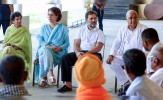Opinion: Rejecting Ram Temple Invite Might Hurt Congress Now, But...
The Congress's decision to give the Ram temple consecration a miss is a seminal decision that underlines that the party has finally decided to fight a long ideological battle versus the BJP and RSS. The Ram Mandir movement will go down in history as one that fundamentally changed the course of Indian politics. It was an initiative that challenged the basic premise of the freedom movement, which was based on a clear distinction between religion and politics. There was an understanding among freedom fighters that religion is a private matter and it should not be mixed with politics. This was the one reason that Mahatma Gandhi, Jawaharlal Nehru and Sardar Vallabhbhai Patel never concurred that the Congress was a Hindu party despite the repeated insistence of Mohammad Ali Jinnah. For Gandhi and Nehru, the Congress stood for pluralism, diversity and secularism, representing every Indian, irrespective of their religious belief.
In contrast, the Hindutva brigade led by Vinayak "Veer" Savarkar and the RSS espoused that India was a Hindu nation in which members of other faiths had to play second fiddle, and had to live at the mercy of the majority community. Gandhi was a fierce opponent of this notion and after his death, Nehru never compromised with this thought process. He was aware that a section of the Congress also believed in the ideology of Hindutva and wanted India to be called a Hindu Rashtra, but Gandhi and Nehru were such colossal figures that these elements in the Congress could never have their way.
The Congress leadership after Nehru, however, was neither so ideologically inclined nor receptive enough to understand the nuances of Hindutva politics. It is no coincidence that after Nehru's death, Hindutva politics started gaining momentum, until it reached where it is now.
It is common knowledge that Indira Gandhi had vacillated between the Left and the Right. If in the 1960s she was........
© NDTV





















 Toi Staff
Toi Staff Belen Fernandez
Belen Fernandez Andrew Mitrovica
Andrew Mitrovica Gideon Levy
Gideon Levy Tarik Cyril Amar
Tarik Cyril Amar Rachel Marsden
Rachel Marsden Warren J. Blumenfeld
Warren J. Blumenfeld Dr Ramzy Baroud
Dr Ramzy Baroud Tafi Mhaka
Tafi Mhaka Adam Makary
Adam Makary
